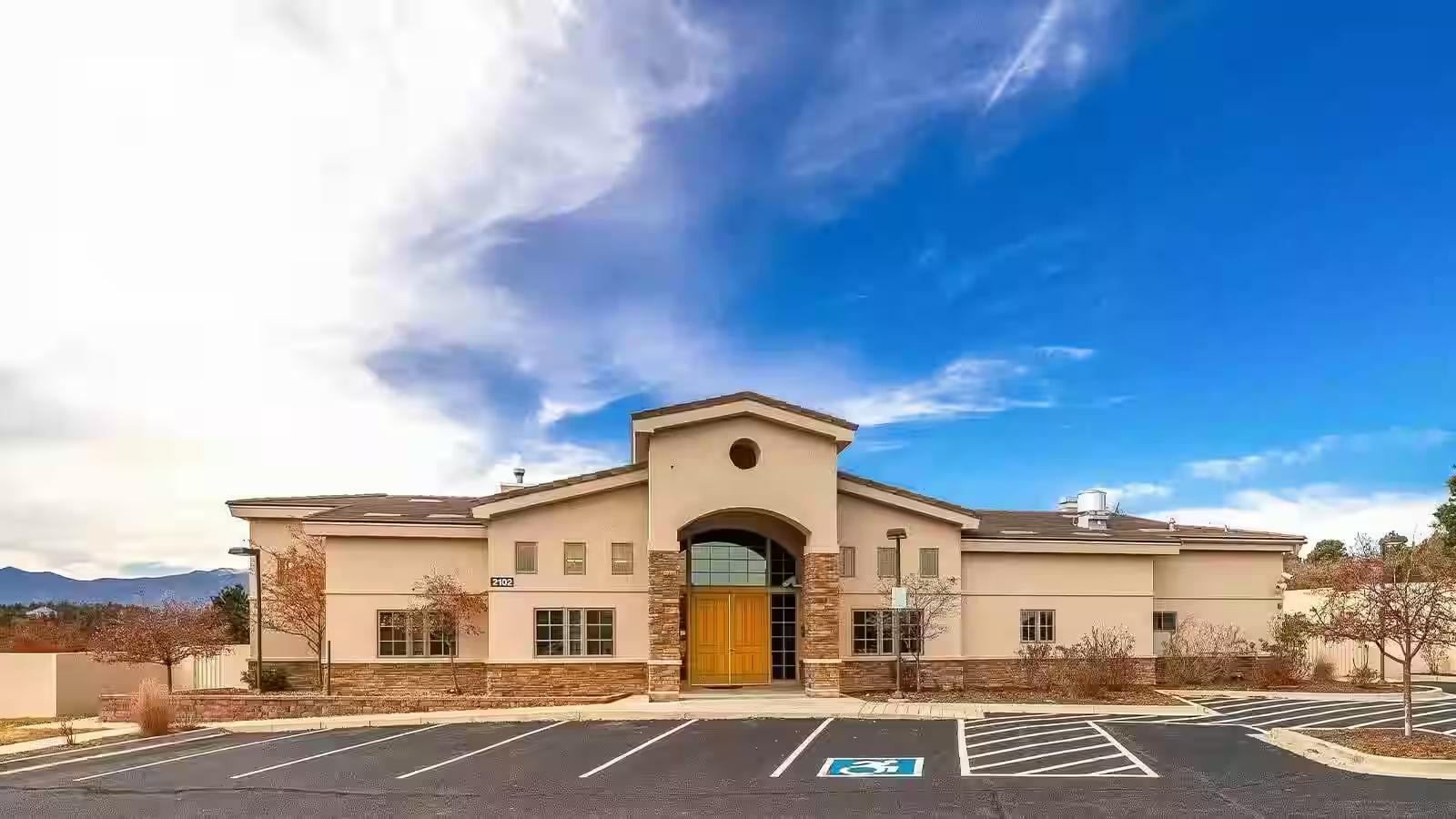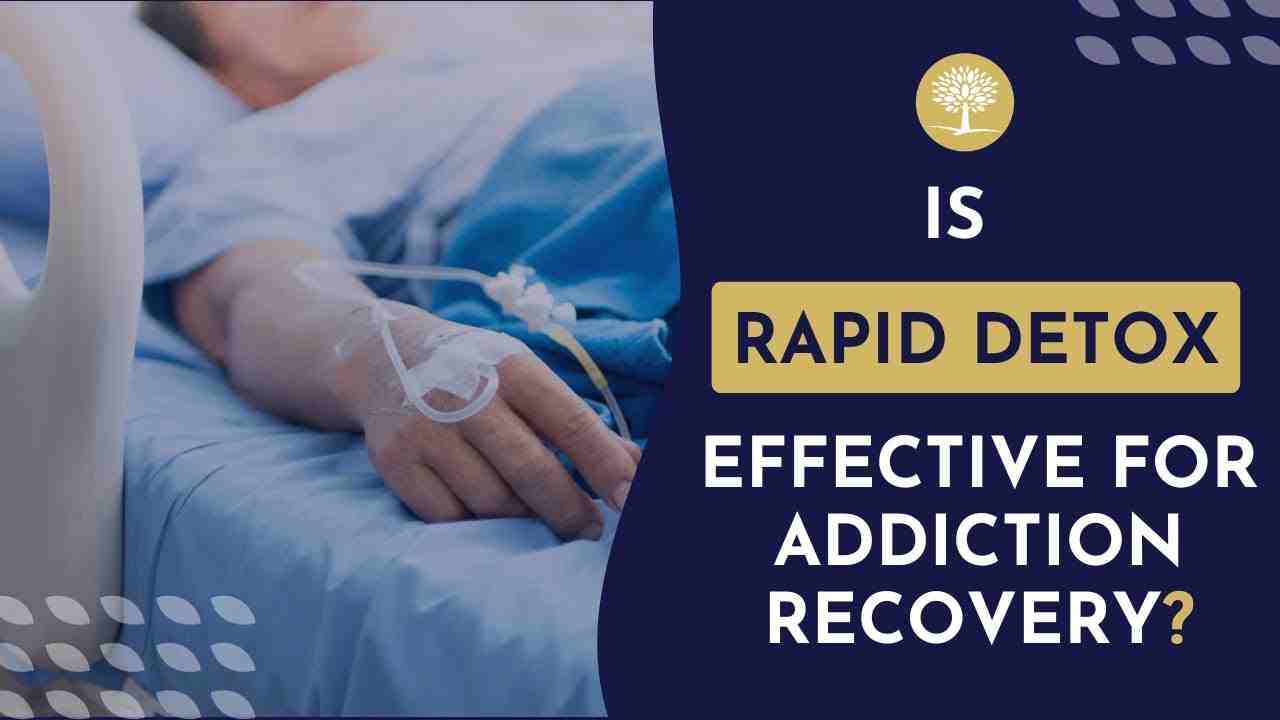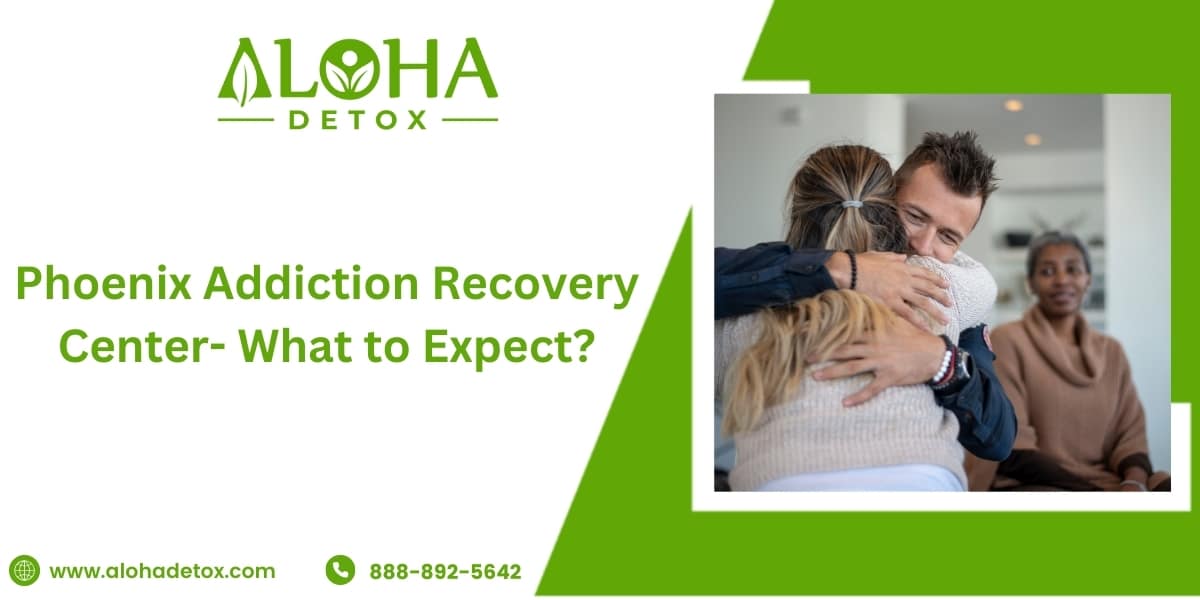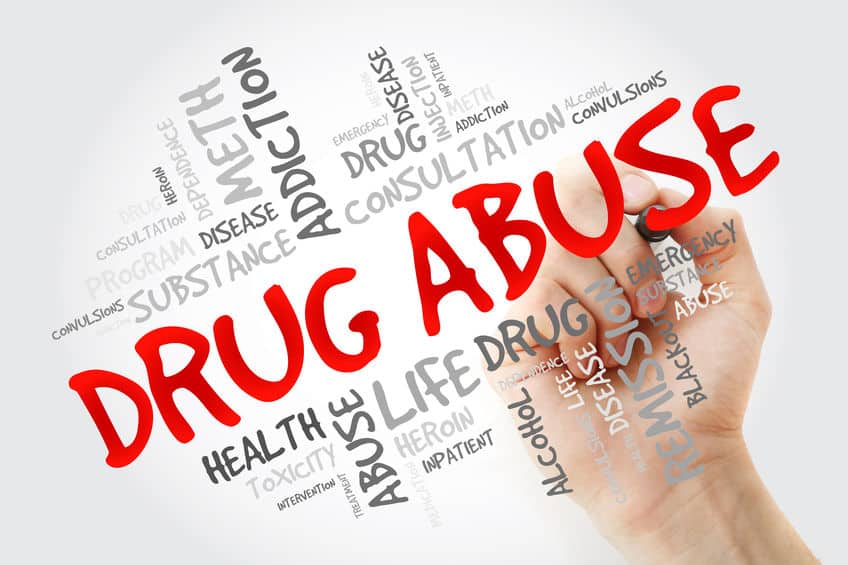
Why Finding Drug Detox Near Me is the First Step to Recovery
Searching for drug detox near me is the critical first step toward recovery from substance dependence. Professional detoxification provides the safe, medically supervised environment needed to manage the physical aspects of addiction. Here’s a quick guide:
- Professional Detox is Essential: Unsupervised withdrawal from alcohol, opioids, and benzodiazepines can be life-threatening.
- Research Local Programs: Medical detox facilities offer 24/7 monitoring and medication to manage dangerous symptoms.
- Find Reputable Centers: Use trusted resources like state directories and verified treatment locators.
- Verify Payment Options: Most facilities accept private insurance, Medicare/Medicaid, or offer sliding-scale fees.
- Reach Out Today: Confidential helplines can connect you with immediate admission options.
Most detox programs last 3-10 days and include medical supervision, symptom management, and preparation for ongoing treatment. The journey can feel overwhelming, but you don’t have to do it alone.
As Addiction Helpline America, we’ve helped thousands find drug detox near me options through our 24/7 confidential helpline. Our team connects you with verified facilities, understanding that starting today can prevent life-threatening complications and pave a safe path to sobriety.
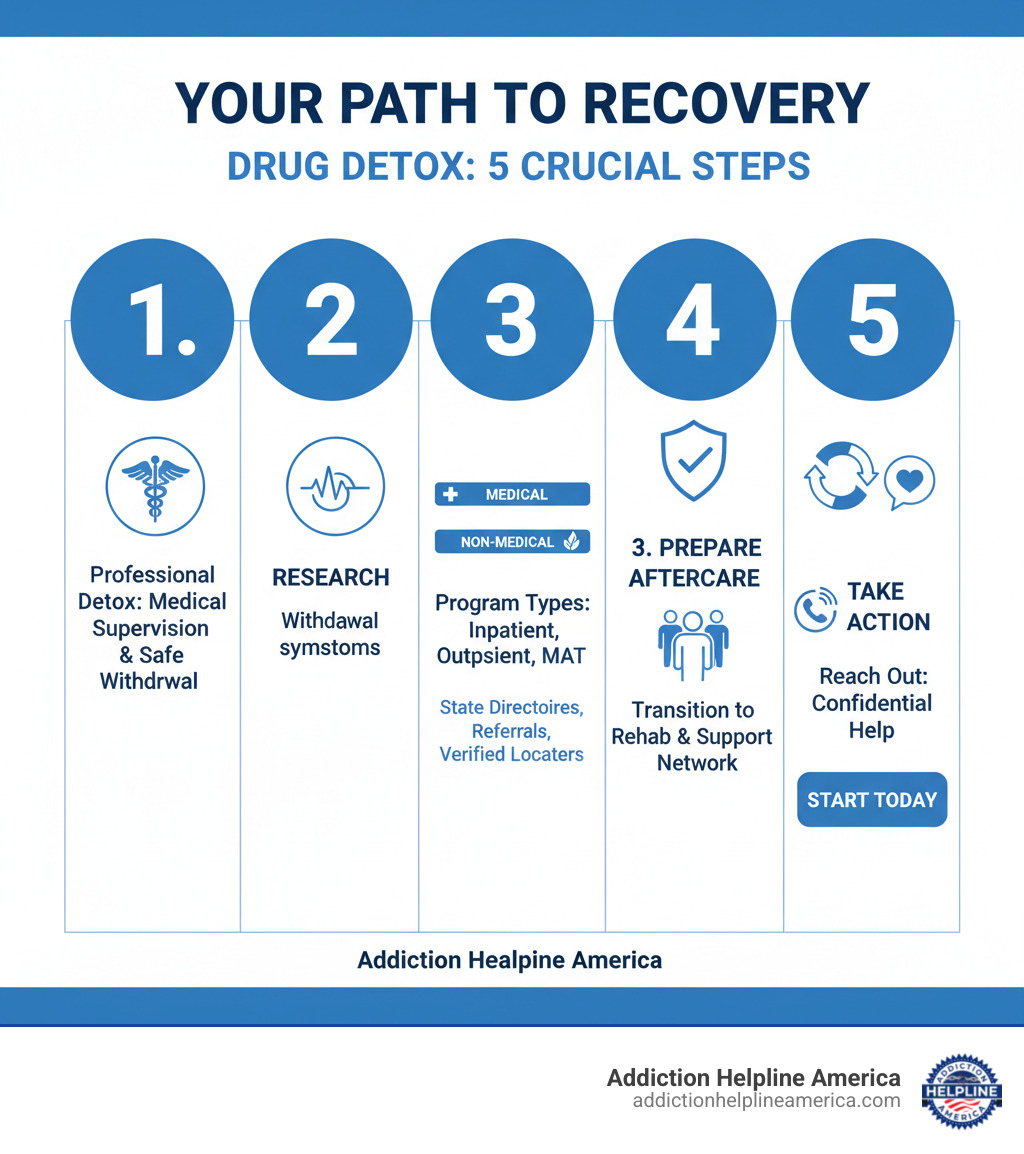
Simple drug detox near me word guide:
1. Understand Why Professional Detox is Crucial
Taking the first step toward recovery requires courage, and understanding why professional detoxification matters could save your life. When you search for “drug detox near me,” you’re looking for safety, support, and the medical expertise that makes withdrawal survivable.
Detoxification is the process where your body clears itself of substances. It’s not just about “getting clean”; it’s about stabilizing your body and mind in a medical environment. When your body is physically dependent on a substance, suddenly stopping can cause withdrawal symptoms that range from uncomfortable to life-threatening. At-home detox is dangerous because you face these risks alone. Professional detox facilities provide 24/7 monitoring, medication to ease symptoms, and immediate intervention if complications arise. This isn’t about comfort—it’s about survival.

Recognize Common Withdrawal Symptoms
Different substances create different withdrawal experiences, but all benefit from professional medical support. Understanding what your body might go through explains why searching for “drug detox near me” is so important.
- Alcohol Withdrawal: Can start with tremors and anxiety but may progress to seizures or Delirium Tremens (DTs), a deadly condition. Alcohol detox should never be attempted alone.
- Opioid Withdrawal: From heroin or painkillers, it causes intense muscle aches, nausea, vomiting, and overwhelming cravings. The suffering often leads to relapse, which is highly dangerous due to lowered tolerance. For more, visit our Opioid Addiction Treatment page.
- Benzodiazepine Withdrawal: Abruptly stopping Xanax or Valium can trigger seizures, panic attacks, and psychosis. Medical professionals use a gradual tapering schedule for safety. Learn more about Benzo Withdrawal Treatment.
- Stimulant Withdrawal: From cocaine or methamphetamine, it creates profound depression, anxiety, and exhaustion. While not typically medically dangerous, the psychological distress can lead to self-harm or relapse without support.
Learn the Dangers of Unsupervised Detox
The risks of detoxing without medical supervision are real and can be fatal. This is why professional help exists.
- Seizures and Delirium Tremens (DTs): Can occur without warning during alcohol or benzodiazepine withdrawal and can be fatal without immediate medical treatment.
- Cardiac Complications: Irregular heartbeats, heart attacks, and dangerous blood pressure changes can happen as your body is under tremendous stress.
- Severe Dehydration: Vomiting and diarrhea lead to electrolyte imbalances that affect vital organs. In a medical setting, IV fluids can quickly correct this.
- Psychological Distress: Severe depression, anxiety, and suicidal thoughts can emerge suddenly. Professional support is crucial.
- Relapse and Overdose: The discomfort of withdrawal often leads to relapse. Because your tolerance has dropped, using your previous amount can result in an accidental overdose.
Medical detox programs use withdrawal management and medication-assisted treatment (MAT) to control these dangerous symptoms. At Addiction Helpline America, we’ve seen the devastating results of attempting detox alone. The safest path to recovery starts with medically supervised detoxification.
2. Research Different Types of Detox Programs
When you’re searching for drug detox near me, you’ll find that not all programs are the same. The right path for you depends on the substance used, length of dependence, and your overall physical and mental health. Most detox programs last between 3 to 10 days, though some situations require longer care. The constant in quality programs is a commitment to your safety and preparing you for the next phase of recovery.
Compare Medical Detox and Withdrawal Management Options
Let’s break down the main approaches. Medical detox provides the highest level of care, with 24/7 monitoring by doctors and nurses. This is lifesaving for people withdrawing from alcohol, opioids, or benzodiazepines. In medical detox, you’ll often receive Medication-Assisted Treatment (MAT) to ease withdrawal pain and reduce cravings.
Withdrawal management is the clinical process of safely guiding your body through withdrawal, managing both physical and psychological symptoms. While some facilities offer clinical support without full medical supervision, we always recommend medically supervised detox for your safety, especially for high-risk substances.
If you’re facing both addiction and mental health challenges, a Dual Diagnosis Treatment Facility is often the best option, as they treat both conditions simultaneously.
Here’s how medical and non-medical detox compare:
| Feature | Medical Detox | Non-Medical Detox (Clinical Detox) |
|---|---|---|
| Medical Supervision | 24/7 medical staff (doctors, nurses) | May have some staff, but not constant medical oversight |
| Medication Use | Often uses Medication-Assisted Treatment (MAT) to manage symptoms and taper | Typically does not use prescription medications for withdrawal |
| Safety for Severe W/D | Essential and safest for alcohol, benzodiazepine, and severe opioid withdrawal | Not suitable for severe, life-threatening withdrawal symptoms |
| Focus | Physical stabilization, symptom management, acute medical needs | Supportive environment, non-medical comfort measures |
| Environment | Structured, clinical, secure | Can be less structured, more community-based |
| Eligibility | Recommended for moderate to severe dependence | Generally for mild withdrawal symptoms or substances with less severe physical withdrawal |
What Should I Expect During a Drug Detox Program Near Me?
Walking into a drug detox near me program can be intimidating. Here’s a typical experience:
- Assessment: Upon arrival, a medical professional will conduct a thorough assessment of your substance use history, medical background, and mental health to create a personalized treatment plan.
- 24/7 Monitoring: Nurses will regularly check your vital signs and monitor for complications, ensuring your safety around the clock.
- Symptom Management: You’ll receive medications to manage withdrawal symptoms like nausea, anxiety, and pain. MAT can dramatically reduce discomfort and cravings for certain substances.
- Nutritional Support: Balanced meals and fluids are provided to help restore your physical health.
- Inpatient Setting: Nearly all medical detox happens in an inpatient setting, providing a safe, structured environment away from triggers. For those with co-occurring disorders, an Inpatient Facility for Mental Health can provide integrated care.
At Addiction Helpline America, we connect you with facilities that match your specific needs, answer your questions, and support you as you take this crucial first step.
3. How to Find the Right Drug Detox Near Me
When you’re ready to take the first step, finding the right drug detox near me can feel overwhelming. With the right approach and trusted resources, you can find a reputable center that fits your needs.

Use Trusted Resources to Locate Centers
The internet can be confusing, so start with verified resources:
- Addiction Helpline America: Our free, confidential service helps you find the right facility from our nationwide network.
- State Health Departments: Most states maintain directories of licensed treatment facilities.
- Your Doctor: Primary care physicians and mental health professionals can provide referrals based on your medical history.
- SAMHSA National Helpline: FindTreatment.gov offers a comprehensive database of licensed facilities.
- Dial 2-1-1: This number connects you to local health and human service resources, including crisis support.
For more insights, see our Local Rehab Centers Complete Guide.
What Factors Should I Consider When Choosing a Drug Detox Near Me?
Once you have a list of facilities, ask these key questions:
- Accreditation: Is the facility accredited by a recognized body like The Joint Commission or CARF? This ensures they meet high standards for care and safety. You can verify facility accreditation through official channels.
- Staff Credentials: Does the team include certified addiction counselors, physicians, nurses, and licensed therapists?
- Individualized Treatment: Does the center create a personalized plan based on your unique history and needs, rather than a one-size-fits-all approach?
- Facility Environment: Is the space clean, comfortable, and supportive? Specialized options like our Mens Rehab Centers Complete Guide or Pet-Friendly Alcohol and Drug Rehab are also available.
Understand Your Payment and Insurance Options
Cost should not be a barrier to getting help. There are many options available:
- Private Insurance: Most facilities accept private insurance. We can help you verify your benefits and understand your coverage.
- Medicare and Medicaid: These government-funded programs are accepted at many facilities and can significantly reduce or eliminate costs.
- Sliding Scale Fees & State Funding: Some facilities adjust fees based on income, and state programs or charities can assist with costs. See our Fix Drug Addiction Charities Support page for more.
- Payment Plans: Many centers offer payment arrangements to make treatment more affordable.
Never let money stop you from seeking help. Call Addiction Helpline America, and we’ll help you explore every available option.
4. Prepare for Life After Detox
Detox is not a cure for addiction. It’s the essential first step that addresses physical dependence, but addiction is a complex disease that also affects your brain and behavior. The real work of healing begins after detox is complete, which is why a comprehensive continuum of care is vital for long-term recovery and relapse prevention.
Transitioning to a Full Rehab Program
After detox, transitioning into a full rehabilitation program is the next critical phase. Rehab helps you address the underlying causes of your substance use and develop coping skills for sustained sobriety.
- Residential/Inpatient Programs: These offer a highly structured, immersive environment where you live at the facility for 30, 60, or 90 days. This allows you to focus completely on recovery through intensive therapy, away from daily triggers. Our Drug Detox Facility Near Me Guide can help you find facilities offering both detox and rehab.
- Outpatient Programs (PHP/IOP): Partial Hospitalization Programs (PHP) and Intensive Outpatient Programs (IOP) offer structured therapy during the day while allowing you to return home in the evenings. This provides flexibility with clinical support.
Building a Long-Term Support System
Sustained recovery requires a robust long-term support system. A good rehab program will help you create a personalized aftercare plan before you leave.
Key components of long-term support include:
- Sober Living Homes: These provide a safe, substance-free environment to transition from inpatient care back to independent living.
- Support Groups: Groups like Alcoholics Anonymous (AA) and Narcotics Anonymous (NA) offer invaluable peer support and fellowship.
- Individual and Family Therapy: Continuing therapy helps you process ongoing challenges and mend relationships. If you’re dealing with co-occurring mental health issues, our Rehabs for Depression Guide offers valuable information.
- Holistic Practices: Incorporating mindfulness, nutrition, and exercise can improve overall well-being and resilience.
At Addiction Helpline America, we help you plan for this entire continuum of care, connecting you with facilities that support your long-term recovery journey.
5. Take the First Step and Reach Out for Help
The hardest part of recovery is often making the decision to start. If you’re searching for drug detox near me, you’ve already taken a brave step. Reaching out doesn’t mean you’ve failed; it means you’re ready to fight for your life.

At Addiction Helpline America, we understand the fear and uncertainty of this moment. A confidential call today can change everything. You don’t need all the answers; you just need to be willing to pick up the phone.
How to Support a Loved One Through Detox
Watching someone you love struggle with addiction is heartbreaking. Your support can make all the difference. Here’s how to help:
- Educate Yourself: Understand that addiction is a medical condition, not a moral failing.
- Offer Support, Not Enablement: Be there emotionally, but avoid actions that protect them from the consequences of their addiction.
- Participate in Family Therapy: Healing together is crucial for creating a supportive home environment.
- Set Healthy Boundaries: Protect your own well-being while showing love. It’s okay to say “no” to requests that enable substance use.
- Consider Professional Intervention: If your loved one is resistant, a trained interventionist can help them accept treatment. We offer intervention counseling at Addiction Helpline America.
For families with teens, our resources on Adolescent Substance Abuse provide specialized guidance.
Making the Confidential Call for Help
Calling Addiction Helpline America is simple, free, and completely confidential. Our helpline is available 24/7 because we know that when you’re ready, waiting is not an option.
When you call, a compassionate specialist will listen without judgment and help you find the right drug detox near me option. There’s no obligation. It’s your chance to ask questions and explore your options with honest guidance. In many cases, we can facilitate immediate admission to a detox facility, often within 24 hours. The person you love—or the person you see in the mirror—deserves a chance at a life free from addiction. That life is possible, and it starts with one phone call.
Frequently Asked Questions about Drug Detox
When you’re searching for drug detox near me, it’s normal to have questions. Here are clear, honest answers to some of the most common concerns.
How long does drug detox typically last?
Most drug detox near me programs last between 3 to 10 days. However, the exact duration depends on several factors. The type of substance is a major one; for example, opioid detox can take up to two weeks, while alcohol and benzodiazepine withdrawal may require a longer, carefully tapered process for safety. The severity and length of your addiction also play a role, as a longer history of use often means a more intense withdrawal period. Finally, your individual health, including age and metabolism, will affect how quickly your body can stabilize. A medical team will create a timeline based on your specific needs.
What is the difference between detox and rehab?
This is a critical distinction. Detox and rehab are not the same; they are two separate but equally vital steps.
- Detox is the first step, focused on the physical. It’s the process of safely clearing substances from your body under medical supervision. The goal is to manage withdrawal symptoms and achieve physical stability. It typically lasts a few days to a couple of weeks.
- Rehab is the next step, focused on the psychological. It addresses the why behind the addiction. Through individual and group therapy, rehab teaches you to understand your triggers, develop healthy coping skills, and build a foundation for a life without substance use. Rehab programs are much longer, often lasting 30, 60, or 90 days.
In short, detox gets the drugs out of your body, and rehab teaches you how to live without them. You need both for lasting recovery.
Are at-home detox options safe?
For anyone with moderate to severe substance dependence, at-home detox is not safe. The primary danger is the lack of medical supervision. Withdrawal from substances like alcohol and benzodiazepines can cause life-threatening complications, including seizures and Delirium Tremens (DTs), which require immediate medical intervention. Even with other substances, severe dehydration from vomiting and diarrhea can lead to dangerous electrolyte imbalances.
Furthermore, the intense discomfort of withdrawal at home leads to a very high risk of relapse. Using again after a period of abstinence is especially dangerous because your tolerance has dropped, which can easily lead to an accidental overdose. Professional medical detox exists to manage these risks with medication, 24/7 monitoring, and a safe, substance-free environment. Your safety is the top priority, and professional care gives you the best chance at a successful recovery.
Your Path to Recovery Starts Today
If you’ve made it this far, you’ve taken a courageous step by learning what drug detox near me truly means. Recovery is absolutely possible, and the hope you feel is real. It’s backed by professional care and proven treatments.
Let’s recap the five steps that can change everything:
- Understand that professional detox is a medical necessity.
- Research program types to find the right fit.
- Use trusted resources to locate a quality facility.
- Prepare for life after detox to ensure long-term success.
- Reach out for help today—it can save your life.
At Addiction Helpline America, we’ve seen how one phone call can transform a life. Our team is available 24/7 to listen without judgment and connect you with the right care from our nationwide network. The call is free, confidential, and there’s no pressure—just compassionate guidance. We can often facilitate admission within 24 hours.
You don’t need all the answers right now. You just need to take one step: reach out. Let us handle the details while you focus on beginning your recovery journey. Your new beginning is waiting. Find comprehensive addiction treatment options in your area or call us directly. We’re here for you.
Our helpline is 100%
free & confidential
If you or someone you care about is struggling with drug or alcohol addiction, we can help you explore your recovery options. Don’t face this challenge alone—seek support from us.
Programs
Resources
Will my insurance
cover addiction
treatment?
We're ready to help
Find the best
drug or alcohol treatment
center
Are you or a loved one struggling with addiction? Call today to speak to a treatment expert.

